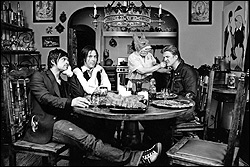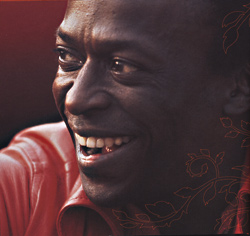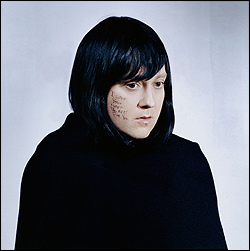The saddest celebrity breakup of 2004 never made it to the pages of Us Weekly. But anyway, online message boards made more fitting venues for those Queens of the Stone Age fans eager to sort through the flurry of misspelled rumor and potty-mouthed innuendo that followed guitarist Josh Homme’s firing of his longtime partner, bassist Nick Oliveri. In interviews, Homme had made civilly reluctant admissions that Oliveri’s excesses had made him more interference than helpmate. But matters initially flared out with the wicked acrimony of betrayed bro-love, the sort that reminds us that Lindsay Buckingham’s defensively jilted “Go Your Own Way” and Lennon’s snide McCartney dis “How Do You Sleep?” have always been flip sides of the same 45.
Listen for the Oliveri-shaped hole at the center of Lullabies to Paralyze (Interscope), and you’ll note instead how the same evolutionary developments that enable us to answer telephones and clip together thumb and forefinger into an “OK” sign also ensure that few hard-rock bass players are irreplaceable. Had Oliveri remained, Homme might still have engineered the new disc’s shift in sound (less metallic blare, more braided guitar intricacy) and maybe even the erosion of gonzoid goofing in favor of the current moody brood. Yet this is recognizably Homme’s record alone. With Dave Grohl skidaddled off and Mark Lanegan’s audible contributions down to some mighty fine croaking on the leadoff plaint, “This Lullaby,” Homme’s current mates, one-time Danzig drummer Joey Castillo and A Perfect Circle guitarist Troy Van Leeuwen, perform like animated extensions of their leader’s ideas, despite strong showings in the writing credits. As for the sneeze-and-you-missed-’em guest spots from Brody Dalle and Billy Gibbons and Shirley Manson, they’re the equivalent of those coveted walk-ons Woody Allen doles out to well-behaved superstars.
But if Homme’s playing with himself here, nobody ever said autoeroticism couldn’t be sensual. Rather than the slasher-flick-as-Nietzschean-wet-dream worldview that metal can succumb to, Homme gets off on the sheer aural thrill of raw power itself, and if he’s sometimes mean to girls, that’s ’cause they’re not much more than troublesome lyrical conventions to him. The obligatory radio single “Little Sister” chugs along with suspiciously pro forma tendencies, maybe because it’s one of the few tracks here that rocks outward rather than curling inward. Even at its most propulsive, this disc is eerily womblike, severed from context, self-sufficient. In fact, if Lullabies didn’t rock so hard, rock-crit hacks might mistake these tracks for the “pop gems” they’re always jizzing about whenever some “Beatlesesque” journeyman valiantly discovers some chord’s relative minor.
There’s something of the indie-rock cloister in Homme’s carefully nerdish attention to guitar tone, in the way the rubbery riff of “Tangled Up in Plaid” wobbles around its approximated notes. (He and Stephen Malkmus would make for a wonktastic supergroup.) But here Homme’s debt is more obviously to the master of obsessive-compulsive ebb and flow—on the pristine “Someone’s in the Wolf,” it’s as though he’s rescuing Jimmy Page’s legacy of perfectionist guitar layering from decades of prancing Plant-lings wailing their own praises as they pin wriggling groupies against the walls of Barad-Dur. Even when the guitar-bass-drums of “Everybody Knows That You’re Insane” click with nigh-Krautrock precision, Homme is busy bouncing guitars from speaker to speaker for nuanced effect. His voice tends toward its shaky falsetto here, which he distorts, then shreds, with graceful yet menacing guitar lines. If Aerosmith extracted the cockiness at the heart of Zeppelin’s pomp, Lullabies to Paralyze isolates the aesthetic puzzle-crafting at the heart of the band’s elephantine shuffle.
Maybe this is an awkward historical moment to rock out so carelessly to such a skillful display of dictatorial control, but these 14 well-tuned trains, running exquisitely on time, make for the most unflagging and engrossing QOTSA full-length yet. Which is maybe as it should be, since despite its do-your-own-thing rhetoric, the Queens’ faux-communal aesthetic was always a little dodgy anyhow. Before you idealize the Queens’ casual model of collaboration, remember that its precursors, those loose conglomerations of talent in which rock aristocrats Clapton and Harrison indulged, were actually the 1970s’ individualist reaction to the utopian ’60s notion of a band as a discrete group of equals. Even Homme’s loose “Desert Sessions” showed just how much the bohemian idea of round-robin creativity mirrored the 21st-century workplace, where independent contractors collaborate sporadically on specific projects, at their own pace, no commitment asked or granted.
Peace Love Death Metal, Homme’s one-off 2004 lark with pal Jesse Hughes as Eagles of Death Metal, was certainly warmer, looser, sillier—you know, more fun. But it was also, like the Oliveri-era Queens, an unequal partnership. Lullabies has a pleasurable heft to it, a job well done from a dude who seems to realize he’s lucky to have one. And its partial retreat into the inner workings of craft seems far from dishonorable, a twin-pronged defense of the notion of meaningful work and the necessity of unproductive leisure. Rock fans have always nervously monitored the health of their favorite bands for the same reason more domestic-minded celeb-junkies obsess over babies and wedding rings—we want to be convinced that our own solitude isn’t permanent, or that our own affective commitments are permanent, or at the very least, that isolation isn’t the essence of the human condition. Josh Homme isn’t going to satisfy us on that end. But he does want us to know that our solitude can be unconditionally ravishing.
Queens of the Stone Age play Endfest’s Main Stage with Social Distortion, Interpol, Hot Hot Heat, and Stereophonics at White River Amphitheatre, 40601 Auburn Enumclaw Rd., Auburn, 360-825-6200. 11 a.m. Sat., June 4. $20–$40 adv. See Seven Nights, p. 58, for full lineup.








